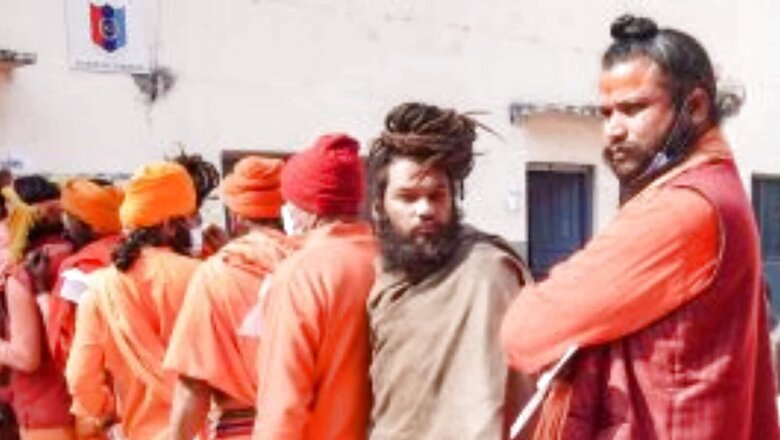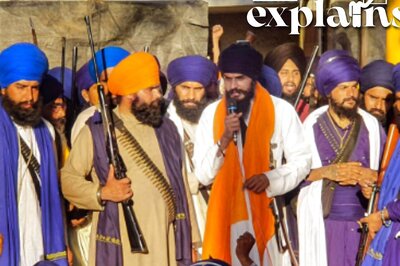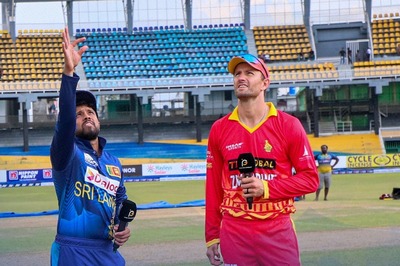
views
“It looks like a democracy. It talks like a democracy. But don’t be fooled by that. It really is a democracy.” – Groucho Marx
These words of Groucho Marx (the legendary Jewish-origin American comedian and actor) seem appropriate about the Indian democracy. Although these words are reassuring the effectiveness of democracy, the same is typical to the Western world which finds Indian democracy inexplicable, or they don’t understand it. Truly, India is an incredibly diverse nation with many regional, religious and linguistic variations and therefore, after it got independence from Britain in 1947, most of the West interpreted that the nation would break up as a result. Since independence, India has chosen the path of democracy and remained so, with only aberrations during the Congress government, when Indira Gandhi declared a state of emergency in India on 25 June, 1975 and restored it on 21 March, 1977.
Against all odds of class structure, ethnic diversity, imparity of income and education, India remained a democracy, giving intellectual surprise to the West. For the last 74 years, Indian democracy has been largely successful on many counts-
- Ensuring the well-being or welfare of its huge population of 1.2 billion.
- Its ability to invoke a sense of national identity, itself, without conflict.
- Its ability to oversee social tensions arising out of the process of development and, not surprisingly, many of such problems are fueled by external sources. The present regime’s special emphasis on the development of the Northeast is showing dividends. The region marred by secessionist movements by and large used to witness lesser participation in the electioneering process, but things are changing rapidly. More and more people are manifesting interest in adult suffrage.
India finds itself in discussions of democracy and authoritarianism of the West, especially by the Americans. Fact remains that democracy in India is essentially an entrenched fact and curiously enough, its success is a matter of surprise to political scientists. The present political party in power receives tremendous criticism from the West for being proponents of Hindutva. They call it a departure from the secular path, which the country’s Constitution established itself after the ouster of colonial rulers in 1947. Such critics believe India’s variant of secularism differs quite significantly from prevailing Western notions, which enforce a strict separation between church and state to foster civic peace and equal rights for all citizens.
Such discourses are misconstrued and are factually wrong or false propaganda. During the Constituent Assembly debate in 1948, it was Jawahar Lal Nehru along with the chairman of the drafting committee of the constitution, B R Ambedkar, were opposed to the idea of including the word ‘secular’ in the preamble of the constitution. India’s Constitution was adjusted to describe it as a secular state during the 1975 emergency, but a subsequent Supreme Court pronouncement found that India has been secular since independence. But India is understood to be a deeply religious country, with diverse religions represented in its population. The Constitution is secular in that it prohibits the persecution of individuals for their religious beliefs, but it does not specifically separate church and state in the fashion of the United States Constitution.
The US is repeatedly taken as the world’s gold standard of democracy and its policymakers rejoice in that status and believe that the whole world looks up to them for seeking lessons on democracy. But how are the things in their backyard? The country still practices disenfranchisement of universal suffrage. It designed a mechanism for presidential elections it believed could deliver democracy, instead, it is still providing an obstacle between direct elections and Congressional elections. The Electoral College is undemocratic as it removes the ability of US citizens to directly elect their president. The presidential election process should have been as simple as eligible citizens voting for a presidential ticket, the ballots being counted, and a clear winner being certified. But, the process is much longer and more intricate because of the Electoral College.
Pew Research Center survey in the US reveals different religious groups including Catholics, Jews and Mormons have suffered discrimination in the United States at various points in history. Americans say some religious groups continue to be discriminated against and are disadvantaged. A survey conducted in 2017 revealed 82 percent of American adults said Muslims are subject to at least some discrimination in the US, and 56 percent said Muslims are discriminated against a lot. Likewise, a survey conducted in 2016 revealed roughly two-thirds of Americans (64 percent) said Jews face at least some discrimination in the US and as many as 39 percent said Jews face a lot of discrimination. Most Americans believe evangelical Christians too, face at least some discrimination.
In contrast to the revelations in the US, a new Pew Research Center report, based on a face-to-face survey of 29,999 Indian adults, fielded between late 2019 and early 2020 before the COVID-19 pandemic, takes a closer look at religious identity, nationalism and tolerance in the Indian society. Across the country, most people (84 percent) say that to be “truly Indian,” it is very important to respect all religions. 80 percent of Indians are also united in the view that respecting other religions is a very important part of what it means to be a member of their own religious community. People in all six major religious groups overwhelmingly say they are free to practice their faiths, and most say that people of other faiths also are free to practice their own religion.
Since last year, a host of western NGOs have been busy downgrading Indian democracy indices, in contrast to revelations of Pew Research Center report. Be it the US-based non-profit Freedom House, which downgraded India from a free democracy to a “partially free democracy,” or Sweden-based V-Dem Institute, which termed India had become an “electoral autocracy.” And then the Economist Intelligence described India as a “flawed democracy.” All these rankings invariably blame Indian Prime Minister Narendra Modi and his Hindu nationalist Bharatiya Janata Party (BJP) government for the backsliding of democracy. Freedom House said civil liberties have been in decline since Modi came to power in 2014, and that India’s “fall from the upper ranks of free nations” could have a more damaging effect on the world’s democratic standards. All these NGOs function in the most clandestine manner, and their surveys are opaque.
When low rankings assigned to India received a mixed response in the country, Professor Salvatore Babones, Associate Professor at the University of Sydney, said there is a clear bias affecting India’s ranking on the democracy indices. According to Professor Babones, the evidence provided by these three organisations does not justify the low and rapidly deteriorating rankings in the last four years. The problem in conducting such surveys is that the rankings reflect the general opinion of the analysts and intellectuals who know the country. For example, when the Economist Intelligence Unit democracy index ranks India, it does not send a team to do fact-finding. Instead, it sends a survey. And all these organisations work the same way. Apparently, these NGOs send a survey to people who are in the field and it is generally conducted by Indian intellectuals like university professors or non-resident Indians who teach/research outside India or journalists from outside India, authors and public intellectuals. Nobody really has access to the list of experts they rely on, but it is apparent that a host of these intellectuals and university professors have a clear bias against PM Modi and BJP.
Let’s do some fact check about Hindutva and the concept of religious democracy as a whole. Irrelevance of religion has been an aeonic concept to political scientists. Prominent social scientists like Marx, Freud, Weber, and Durkheim propagated the assumption that modernisation leads to privatisation, and thereby, gradually contributed to the disappearance of religion from the public space. However, the trend didn’t last long, as there has been intermingling of religion with major political events throughout the world — be it the American Revolution, the civil rights movement, the end of apartheid or the collapse of communism in Eastern Europe. There has been a growing importance of religion in world politics as well as in people’s lives — both in underdeveloped and developed countries. Therefore, India is not an exception.
Going by Western beliefs, historically speaking, modern democracy originated and sculpted itself in Western Europe. And historians also indicate that democracy could’ve originated there because of requisite conditions like — one, there was the anthropological component that presupposes that every human being must confront God by himself, which later became the basis for universal human rights. Two, there was the sociological element that requires the separation between the state and the church. The best example of religious democracy can be of Norway, as it has been a democratic country since its independence in 1905 and is adjudged among the highest-ranked countries for the quality of democracy. Till 2012, Norway had a form of constitutional religious establishment that made the Evangelical Lutheran Church a state church. Although through a constitutional amendment, the position of the established church was altered, it is not abolished.
The rise of the Muslim Democrats has begun the integration of Muslim religious values—drawn from Islam’s teachings on ethics, morality, family, rights, social relations, and commerce, for example—into political platforms designed to win regular democratic elections. Challenges and setbacks will almost surely complicate the process, and the outcome is far from certain. Yet, the ongoing dynamics of democratic consolidation, more than the promise of religious reform and ideological change, is likely to define the terms under which Islam and democracy interact in at least several Muslim-majority lands. The past few decades have witnessed open electoral competition for legislative seats in Bangladesh, Indonesia, Malaysia, Pakistan, and Turkey.
UN Office of the High Commissioner for Human Rights (1993) in General Comment No. 22 (para. 9) observes the fact that a religion is recognised as a State religion or that it is established as official or traditional or that its followers comprise the majority of the population, shall not result in any impairment of the enjoyment of any of the rights under the Covenant, nor in any discrimination against adherents to other religions or non-believers. In slight contradiction, the UN General Assembly, Human Rights Council (2011) has observed that while the notion of state religions is not per se prohibited under international human rights law, states have to ensure that this does not lead to a de jure or de facto discrimination of members of other religions and beliefs. It seems difficult, if not impossible, to conceive of an application of the concept of an official “State religion” that in practice does not have adverse effects on religious minorities, thus discriminating against their members.
Each Constitution-making initiative takes place in a particular country with its own set of religious histories, identities and cultures. For example, Lebanon — where there is one majority religion and a well-defined minority religion (67.8 percent are Muslims, 31.9 percent Sunni, 31.2 percent Shia; with smaller percentages of Alawites and Ismailis, and 32.4 percent are Christians) and the Lebanese political system is based on a balancing of Muslim and Christian powers intended to ensure that one does not oppress or exclude the other. Therefore, in a multi-cultured society, a pluralist form of religious recognition reassures cooperation and harmony. Egypt’s Constitution (2014), while formally establishing Islam, also specifically recognises the rights of the Christian community.
In the Indian context, the Supreme Court has cleared the ambiguity surrounding the term “Hindutva” in the matter of Dr Ramesh Yeshwant Prabhoo v. Prabhakar Kashinath Kunte & Ors., (1996) 1 SCC 130 and observed that no precise meaning can be attributed to the terms “Hindu,” “Hindutva” and “Hinduism”; and no meaning in the abstract can confine it to the narrow limits of religion alone, excluding the content of Indian culture and heritage. Ordinarily, Hindutva is understood as a way of life or a state of mind and it is not to be equated with or understood as religious Hindu fundamentalism. Hinduism or Hindutva cannot be confined merely to describe persons practicing the Hindu religion as a faith and cannot be considered per se as depicting hostility, enmity or intolerance towards other religious faiths or professing communalism.
In Dr Ismail Faruqui & Ors. v. Union of India & Ors. (1994) 6 SCC 360, the Supreme Court observed that Hinduism is a tolerant faith, it is that tolerance that has enabled Islam, Christianity, Zoroastrianism, Judaism, Buddhism, Jainism and Sikhism to find shelter and support upon this land. There is no doubt that the moderate Hindu has little taste for tearing down the place of worship of another to replace it with a temple. Quoting Mahatma Gandhi, the Supreme Court observes that India cannot cease to be one nation because people belonging to different religions live in it and in no part of the world is one nationality and one religion synonymous, nor has it ever been so in India.
To call India an electoral autocracy because electorates mandate a Hindu Nationalist party into power in two successive elections is irrational, and then calling it a flawed democracy, falling from the upper ranks of free nations, smells intolerance towards a secular nation as well as billions of people practicing a secular way of life.
“May all beings look on with the eyes of a friend; May I look on all beings with the eyes of a friend; May we look on one another with the eyes of a friend.” – The Prithvi Sukta in the Atharva Veda
The author is an Advocate on Record in the Supreme Court of India. Views are personal.
Read all the Latest Opinions here




















Comments
0 comment